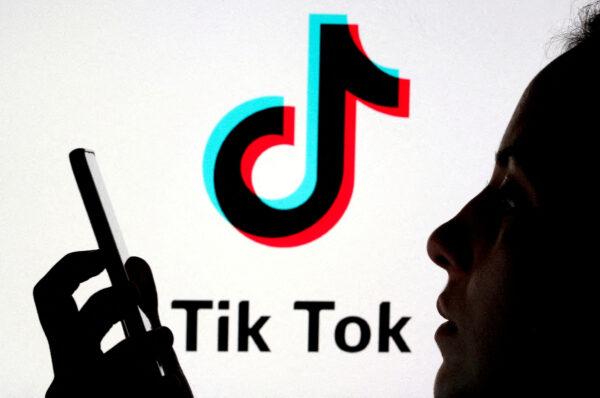Campaigners in the United Kingdom are calling on the government to do more to prevent children’s growing screen addiction and exposure to violent and harmful online content—but have warned the online safety bill is not the answer.
Children’s rights group Us For Them runs a Safe Screens campaign and is urging the government to issue clearer guidance to parents and schools but is also calling on the technology giants to stop ignoring the problem their products are creating.
The latest call for action comes in the same week as newly published research from Ofcom which found that children’s exposure to harmful content while still at primary school is “inevitable” and “unavoidable.”
The regulator found that all 247 of the children it spoke to reported seeing violent content online, mostly via social media, video-sharing and messaging sites and apps, with “many” saying this had happened when they were younger than the platform’s minimum age restrictions.
Arabella Skinner told The Epoch Times the problem of children’s smartphone use—and addiction—gets “worse and worse” as more research emerges.
“The age when kids get phones just gets younger and younger ... six, seven, eight-year-olds just get hand-me-down phones,” she said, adding it is very difficult for parents to deny children their own device when all their peers have them, with research showing 60 percent of 8—11 year-olds and 97 percent of 12—15—year-olds have their own phone.
She said there are serious issues around children “sexting” each other—and then being blackmailed, as this behaviour is increasingly normalised through exposure to online pornography, as well as kids being groomed by adults online.
“The tech (companies), if they wanted to, could stop it overnight,” Ms. Skinner said, although she recognised that regulation was a “complex, global problem.”

‘Addictive By Design’
“Phones are addictive by design,” she said, adding that for the social media companies, “That’s where you get data, that’s where you get eyes, that’s where you get adverts.”The campaign group is calling for smartphones specifically designed for under-18s to be brought to market, pre-loaded with suitable and useful apps and with automatic blocks for inappropriate content.
“You need to be able to access the bus ticket app because you can’t get on the bus otherwise ... parents want their children to be able to call them.”
“Technology should work for us, rather than us working for technology.”
“There was a TikTok ’tic' trend, where there was an increase in Tourette’s ... which sounds unreal but it was a proven phenomenon,” she said.
But she believes the Online Safety Act, which was passed last year, fails to provide the regulation required to protect children.
“It’s a very unwieldy (law)—it’s enormous ... And it causes big issues around the freedom of speech problems that we all are aware of. But it doesn’t solve the issue of protecting our children. It’s not strong enough.”
She said there were “some small steps” in the right direction—such as age verification to access online pornography—but that more onus should be placed on social media companies to protect children.
‘Mobile Free School Day Should Be The New Norm’
Schools Minister Damien Hinds told an education committee this week that the government is aiming to create a school day completely free of mobile phones—including breaks and lunchtimes.The minister said there are no plans to make a mobile phone ban statutory because he said “probably all schools” have some kind of restrictions on mobile phone usage and that he did want to “prescribe the micro details” of their policies.
“Nowhere is it allowable to pull out your phone in the middle of Maths, and some schools have much more restrictive (rules) than that,” he said.
“What we are trying to do is create a new norm ... which says that the entirety of the school day, including break and lunchtime, should be free (of devices), because there is a lot of prevalence of electronic use in children as well as adults, we want to make the whole school day free of mobile phones, and all that comes with that—the social media and so on.”
“In break and lunch we want children to be together, enjoying being children together, and talking and so on.”
‘A Controlled Experiment’
The Conservative MP Robin Walker, who heads the committee, said that lockdown could be described as “a controlled experiment in giving children an awful lot of digital exposure in their lives.”Mr. Hinds said he did not think it could be described as “controlled” because there was no country that had been totally free of any restrictions and that time spent online had increased all over the world for both children and adults.
He said it was right to be “conscious” and “concerned” about children’s use of mobiles, but said the government has no plans to recommend to parents at what age they should give their children their own personal device.
Pressed by Conservative MP Anna Firth on whether the government would look at trying to establish clear guidelines with the Children’s Commissioner on what is a safe, recommended amount of screentime, he said that ultimately, “You want children to be developing their own sense of what is a healthy amount of time to be spending online.”
‘Extreme Breathing Challenges’ Linked To Deaths
Ms. Firth raised the issue of “extreme breathing challenges” on platforms often used by young people— notably TikTok—and said these have been linked to the deaths of children in the UK.Mark Bunting, director of online safety strategy for Ofcom, told the committee he was not familiar with such online “challenges,” but it was a concern to the regulator that the algorithms of social media may be promoting “illegal and dangerous content” to users.
He said that following a coroner’s request, there are new powers in the Online Safety Act to require internet servers to provide all data they hold about a child’s online activity—but only in the event of a child’s death can parents demand such access.
A second study for Ofcom by Ipsos UK and social research agency Tonic, revealed that children and young people who had encountered content around suicide, self-harm and eating disorders described it as “prolific” on social media, and claimed that such frequent exposure contributed to a “collective normalisation and often desensitisation” to serious issues.
A third study for Ofcom by the National Centre for Social Research and City University found that cyberbullying is happening anywhere that children interact online, causing wide-ranging negative impacts to their mental and physical health.
Gill Whitehead, Ofcom’s online safety group director, said: “Today’s research sends a powerful message to tech firms that now is the time to act so they’re ready to meet their child protection duties under new online safety laws.
“Later this spring, we’ll consult on how we expect the industry to make sure that children can enjoy an age-appropriate, safer online experience.”
Safe Screens is calling for “prominent, tobacco-style warnings” to be placed on smartphone packaging and adverts for devices and apps, and a government or industry-funded marketing campaign to raise awareness of the risk of harm from excessive screen time.
“We think that manufacturers and content providers should absolutely be obliged to demonstrate the safety of the software and the devices in the hands of the children,” Ms. Skinner said. “They actually need to be showing that they have thought (about) how this impacts children ... that they have looked at their product through the eyes of a child.”







